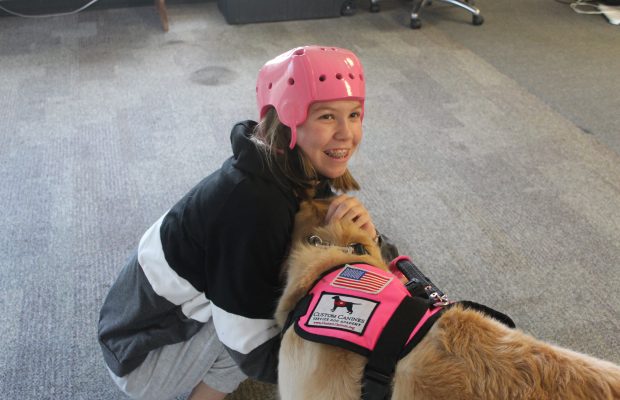Service dogs lend a supporting paw

Students are starting to see something new on campus: a friendly, furry golden retriever. But this dog is not here to play, this dog is on a mission.
Willow is a service dog, helping her owner live a safer, more independent life. Avery Finger, sophomore, has epilepsy, a brain disorder with abnormal nerve cell activity, and often suffers from seizures. When the Finger family received Willow one year ago, they were hoping that the three-year-old puppy could help Avery when her condition was at its worst.
“When Avery has a seizure, her service dog jumps into action and will lick her face, often times pulling her out of the seizure immediately,” Anne Alvarez, special education teacher, said. “Sometimes the dog will sense a seizure coming on and will jump onto Avery’s lap and lick her face, preventing a seizure.”
As a service dog, it is Willow’s duty to be by Avery’s side all day every day, from waking up in the morning with Avery to helping out with the seizures that may be life threatening.
Hannah Neiyer, senior, has known the Fingers for two years, and has seen how the dog has impacted Avery’s life.
“She has more opportunities on campus now because she has a safety net through the dog,” Neiyer said. “She can probably do more things on campus and maybe not be as limited, like in her adaptive PE class, she can probably participate more.”
It was a long road to get Willow. A chance encounter led to a meeting with the company Custom Canines, which trains and matches service dogs. According to the company, puppies have to be 8-10 weeks old before they can begin training, and the training process can take anywhere from 12-20 months. Avery was put on a waiting list, and in 2018, after three years, she was matched with Willow.
“It’s amazing how much they can teach that dog in such a short period of time because Willow is super smart. She is still in training, but she’s progressed far enough that she’s allowed to be at school,” Neiyer said.
Jenny says that she feels comforted by Willow’s presence on campus, and she has noticed a change in Avery too.
“She’s been a lot happier and she has been a lot more independent,” Jenny said. “We wanted to give Avery independence, hoping Willow would be able to take care of her when she has a seizure.”
Although Jenny calls Willow a “friendly face at school,” she, Neiyer and Alvarez stress that when the dog has a vest on, no one can pet her.
“When she has her pink vest on, we cannot touch her… This is sometimes very hard because Willow is a very beautiful and compassionate dog,” Alvarez said.
Before Willow could even come to school, though, there was concern about student allergies on campus. Alvarez and the Finger family had to work with the school nurse, Betty Greene, and the principal, Stephen Lepire, to make sure that all students could be accomodated, but Willow ended up helping more people than just Avery.
“It was decided that having the dog at school was a true benefit for Avery,” Alvarez said. “As it turns out, it has been much more beneficial that any of us had anticipated. Avery’s seizures have dramatically decreased, (and) the students in my classroom have reduced their inappropriate behavior. The dog seems to have a calming effect on everyone in the class.”
According to Alvarez, “Willow is now just a member of our classroom.” Willow’s constant presence is a “comfort” for Jenny, Neiyer and Alvarez; and for Avery, Alvarez notes the bond that Avery and her dog formed almost instantly.
“Since bringing the dog to school, Avery and Willow have created a tighter bond. Avery is taking responsibility for the dog and Willow has responded by being closer to Avery and responding quickly to her,” Alvarez said.
Neiyer has seen the same thing — a connection forming between the pair unlike any other.
“Willow loves Avery and always wants to be around her which is what Willow is supposed to do…Willow’s kind of like that nagging parent to her that’s almost always around, but it’s kind of cute,” Neiyer said.
Willow is still new to campus and learning the ropes of her important mission, but the Finger family is optimistic about the future.
“ I think it could be amazing,” Jenny said. “It could help a lot with her seizures, and help us help her.”
